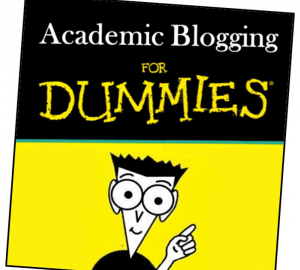REL 360 is our brand new, one-credit course entitled “Popular Culture/Public Humanities,” and organized by Prof. Rollens. Students who take this course watch a series of movies, attend a public lecture, and then have the opportunity to discuss the material together with faculty. They write short responses to their favorite events, one of which will eventually be published on our department’s blog.
To introduce the students to the phenomenon of academic blogging, their first assignment was to examine other posts on the department blog and tell us what they thought makes an effective post. We received some great and perceptive insights, and so we’ve distilled their responses down into these Top Ten Tips for Academic Blogging. If you’re ever asked to blog in a class, these tips would be a great place to start.
1. Know your audience
“The blog is different from other forms of publishing media for a few reasons… Perhaps the most significant difference is the fact that readers can respond to the blog immediately and begin a discussion and share ideas related to the issues addressed in the blog post.”
2. Think big picture
“The goal of these posts should be to raise questions and make a point without being too broad. The posts should discuss individual topics that, when put together, can add up to a much larger and broader topic.”
3. Stay organized
“Academic blogging is essential in asserting a personal take on material that sparks intellectual thought and conversation. The form of a blog post should be well organized prose so that your reader can easily follow the arguments made.”
4. Make it interesting
“A blog post is a little different from media because it can take the form of whatever the author watns… What makes a blog post effective, however, is its capacity to ‘grab’ its audience and interest readers in a way that goes beyond intelligent and informative writing.”
5. Add media
“With a blog post, you are able to add links to pictures, videos, and tweets, which allow you to broaden your subject content in a reader-friendly and engaging way… By adding hyperlinks to your blog, you can increase its effectiveness, because your reader will be fully versed in the subject material of your blog, which allows them to greater comprehend your post.”
6. Have a conversation
“An academic blog is like a traditional blog in the sense that it’s typically a little more informal than, let’s say, a paper. However, an academic blog is concentrated more around provoking thought and discussion in a way that’s more conversational.”
7. Keep it short
“A blog post is effective when it is concise, engaging, and entertaining in some way. First, a post that drags on for too long can become boring and therefore disengaging. Further, engagement and entertainment also fit together. If a post is entertaining to the readers, then they will be engaged.”
8. Make them see what you see
“For me, a great academic blog post is one that manages to leave a person with ‘light bulb-AHA’ moments by the end of it… A blogger should be thinking of how to take a huge concept like classification or identification and present it in a way for the audience to grasp it and see the takeaway. It isn’t to be pushy but laid out in a way for the audience to connect the dots.”
9. Raise questions
“Though opinions can be presented in a blog post, they should be backed up by solid evidence and academic plausibility… It is better, in fact, to present arguments in the form of questions, leaving the reader to decide what the evidence proves.”
10. Inspire further discussion
“Academic blogging is different from other forms of blogging because it is meant to encourage discussion and provoke further thought on a subject. Academic blogs are similar to other blogs in that they ought to be concise and poignant in their contents if their authors wish for them to be effective.”
 These tips were compiled from responses written by REL 360 students: Brittany Brooks, Sarah Griswold, Vincent Hills, Khortlan Patterson, Catie Stewart, and Emily Vork.
These tips were compiled from responses written by REL 360 students: Brittany Brooks, Sarah Griswold, Vincent Hills, Khortlan Patterson, Catie Stewart, and Emily Vork.

Hey there! I came across your blog post on academic blogging and I must say it’s really helpful. As someone who is new to the world of academic blogging, I have been struggling to find the right balance between presenting my research in a way that is accessible and still maintaining a professional tone. Your top ten tips have provided me with a much-needed roadmap to follow, and I appreciate the effort you put into sharing your insights.
I especially found the advice on “finding your niche” and “writing for an audience” to be very valuable. It’s easy to get caught up in the technical details of your research and forget that your ultimate goal is to share your findings with a wider audience. Identifying a specific audience and tailoring your content to their interests and needs can help ensure that your blog is both informative and engaging. And when it comes to finding your niche, your suggestion to “make it personal” really resonated with me. As you said, “what makes your blog different is you,” and I think this is an important reminder for anyone starting out in academic blogging.
In conclusion, thank you for sharing your expertise and insights on academic blogging. Your tips have given me a better understanding of how to create a successful blog that can reach a wider audience while still maintaining a high level of professionalism. I look forward to applying these tips and seeing the positive impact they will have on my blog.